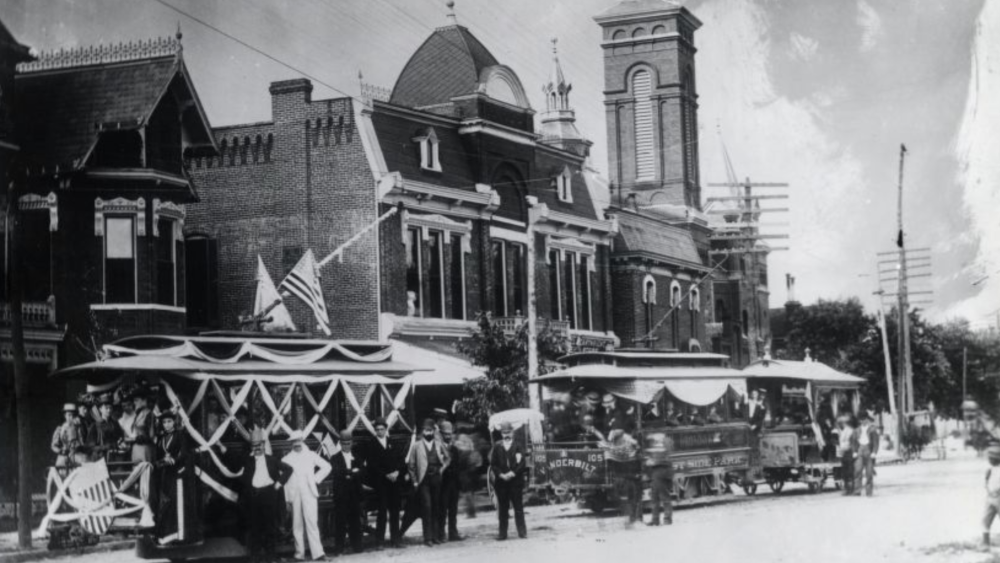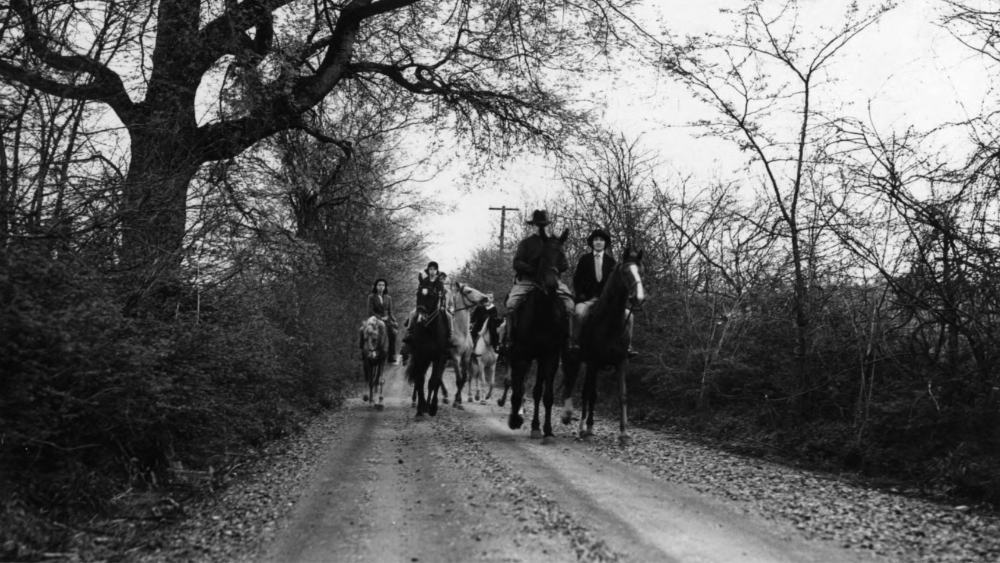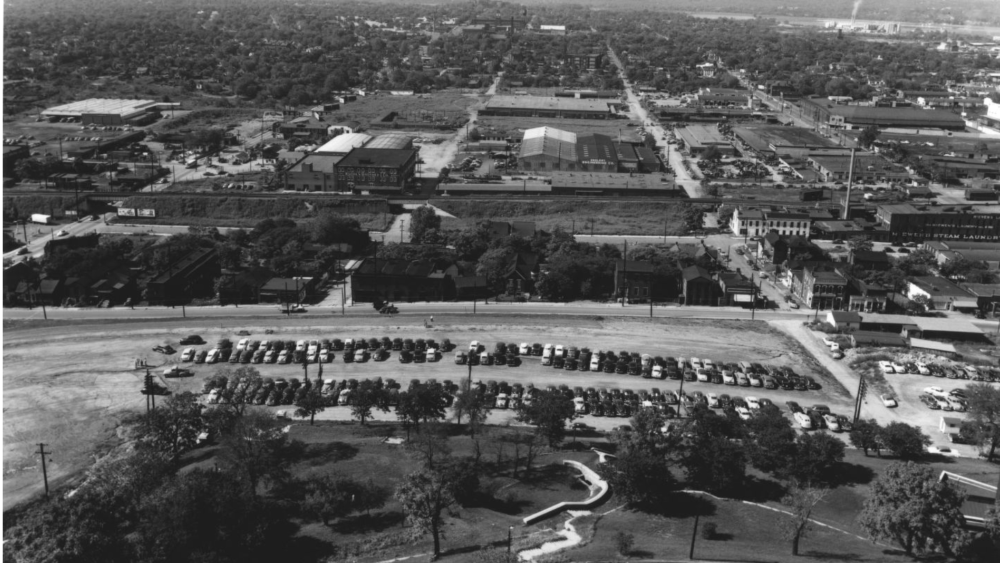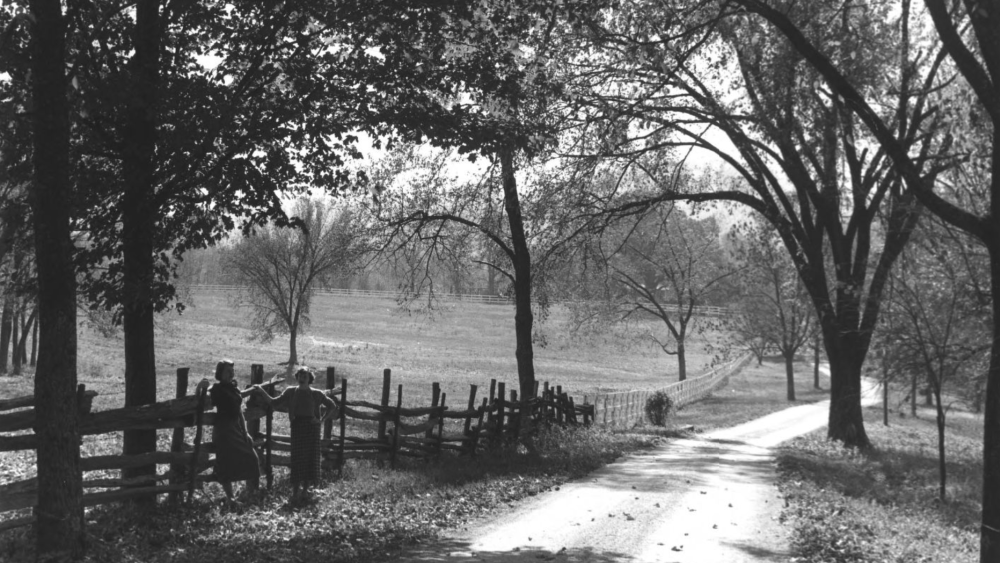The city of Nashville was incorporated in 1806 and later named as the capital of the State of Tennessee in 1843. Now that 200+ years have passed, the city and its streets are chock-full of vibrant history.
It’s safe to say that over the years, the city has been touched by countless historical figures and happenings — many of which have shaped the names of Music City’s buildings, parks, and streets. In this guide, we’re delving into the history of Nashville’s streets — specifically how they were named.

The inaugural run of Nashville’s first electric streetcar at 16th Avenue and Broad Street in 1889.
Photo courtesy Tennessee State Library & Archives
Downtown
Nashville’s entertainment district is filled with honky tonks, historical properties, and is almost entirely made up of local businesses (77%) — making it a top destination for tourists and locals alike.
Broadway — Originally named Broad Street and one of the first streets in the city, this major roadway was one of just three running east to west on Nashville’s original plat map. The width of the street allowed goods to be transported via the Cumberland River through the middle of town to their destinations.
James Robertson Parkway — Named after the “father of Middle Tennessee,” James Robertson is known for his claim to the land in which downtown’s Fort Nashborough was built on December 25, 1779.
Rep. John Lewis Way — Formerly portions of 5th Avenue North, Metro Council voted to rename the street after civil rights leader and congressman John Lewis in 2020. Lewis played a key role in organizing sit-ins at Nashville’s segregated lunch counters.
Church Street — This street was originally named Spring Street after the “first only spring on high ground south of the Public Square.” Many churches later lined the street, and people started informally calling it Church Street before the name was officially changed.
Demonbreun Street — Named for Timothy Demonbreun, a French-Canadian fur trader who first traveled to the area in 1769. He is known as Nashville’s “First Citizen” and his monument sculpted by Alan LeQuire overlooks the Cumberland River near Fort Nashborough.
Anne Dallas Dudley Boulevard — The one-block street bordering Church Street Park and the Hermitage Hotel was renamed from Capitol Boulevard in 2017. The street is dedicated to Anne Dallas Dudley, who is recognized as a key figure in the ratification of the 19th Amendment.
Deaderick Street — This strip of downtown that connects Legislative Plaza to the Metro Courthouse is named after George M. Deaderick, a prominent local banker. Deaderick is notably linked to another thoroughfare, having donated land in the late 1780s that would later become Printers Alley.
Printers Alley — Speaking of Printers Alley, this area was known as a thriving publishing and printing hub by the mid-19th century. Fast forward to the 1940s, when the stretch between Union and Church emerged as a nightclub district. Today, the neon glow of bar signs continues to light up the alleyway.

People traveling by horse on a graveled Granny White Pike in 1939.
Photo courtesy Tennessee State Library & Archives
West Nashville
Boasting community-centric neighborhoods each with their own character, West Nashville is a destination for outdoor adventure and is filled with modern restaurants and shops.
Old Hickory Boulevard — This road connects to multiple Nashville interstates, creating an incomplete loop around the city. It was named for President Andrew Jackson, who was coined “Old Hickory” by his men.
Charlotte Pike — Charlotte Road was named for the wife of James Robertson, Charlotte Reeves Robertson. The city began renaming portions of roadways — Charlotte Avenue and then on to Charlotte Pike — in order to “provide continuity with the Charlotte road name.”
White Bridge Pike — This roadway was named in reference to a white concrete bridge built across the railroad tracks and Richland Creek . It is now used by pedestrians walking the Richland Creek Greenway.
Briley Parkway — Named after Metro Nashville’s first mayor, Beverly Briley. He was born in West Nashville and attended Vanderbilt and Cumberland Law School. Briley also served in the US Navy during WWll.
Granny White Pike — Named for Lucinda White, a widow with two children who purchased 50 acres of land and ran a well-known tavern praised for its food, comfortable beds, and brandy.

An aerial view of North Nashville overlooking Gay Street and the Jefferson Street area.
Photo courtesy Tennessee State Library & Archives
North Nashville
This area is known for its vibrant dining and arts options, as well as rich history of streets, buildings, and universities. Long before Broadway’s running list of entertainment venues, North Nashville was recognized for its music scene.
Dr. Walter S. Davis Boulevard — The road surrounding Tennessee State University was named after TSU president (1943-1968) Dr. Walter S. Davis. Under his leadership, Tennessee Agricultural and Industrial State College achieved university status, 24 new buildings were added, and the athletics program flourished.
Ed Temple Boulevard — This street is named for TSU track and field coach Edward S. Temple. He coached the women’s program for over 40 years, leading 40+ athletes to the Olympics and assisting with over 30 national titles.
Jefferson Street — Named for President Thomas Jefferson, this street connects Nashville’s three HBCUs and was a center for organizing protests and Nashville’s sit-ins. For decades, the street’s venues supported rock ‘n’ roll and blues music via artists like Jimi Hendrix, Etta James, Ray Charles, and more.
Rosa L. Parks Boulevard — In 2007, the Tennessee General Assembly renamed the majority of 8th Avenue in honor of Rosa L. Parks as part of its practice to name “certain highways and bridges in honor of those exemplary public servants.”
Buena Vista Pike — The Buena Vista neighborhood is listed on the National Register of Historic Places in 1980 and the Spanish name translates to “good view.”

An aerial view shows the East Nashville High School and its surrounding land in 1947.
Photo courtesy Tennessee State Library & Archives
East Nashville
East is primarily residential with mixed-use development lining the main thoroughfares. The area is generally characterized by its eclectic vibe and combines historic buildings with modern architecture and businesses.
Eastland Avenue — This roadway previously known as Vaughn’s Pike was named for and led to a 19th century farm near the river, according to the Eastland historical marker erected in 2018.
Ellington Parkway — Named for Buford Ellington, who was elected Tennessee’s governor two separate times (1959-1963 and 1967-1971). The politician is known for creating the Tennessee Human Relations Commission.
Dickerson Pike — The roadway, sometimes referred to as Dickerson Road, was originally known as Dickinson Meeting House Road. According to this historical account, it was likely changed due to a misspelling. Jacob Dickinson, a landowner in the area, gave his land to a nearby church for which the road was called.
Rosebank Avenue — Fairfax Hall (415 Rosebank Ave.) was purchased by Ezekiel Truett in 1855. Later, Truett established the Rosebank Nursery. The street on which the home is located takes its name from the successful nursery.
Fatherland Street — This Nashville street was named for John Shelby, a “significant figure in Tennessee’s early medical history.” Both Fatherland and Boscobel Street take the name of the late Shelby’s two area mansions. Shelby Street and Shelby Park were also named in memorial of him.

Autumn south of Nashville just off of Old Hickory Boulevard in 1953.
Photo courtesy Tennessee State Library & Archives
South Nashville
Just south of downtown, you’ll find standalone neighborhoods like 12 South and WeHo packed full of shopping, dining, and art — travel a wee bit further and you’ll find yourself in the heart of South Nashville, a truly residential area of the city.
Thompson Lane — Glen Leven Farm was established six years before Tennessee became the 16th US state. The farm remained (mostly) in the Thompson family until 2006 and the roadway is named for them.
Sidco Drive — Stands as an acronym for Southern Industrial Development Co. The locale is known for its “light industrial vibe” and is a “desirable area for industrial tenants due to its centrality and access.”











